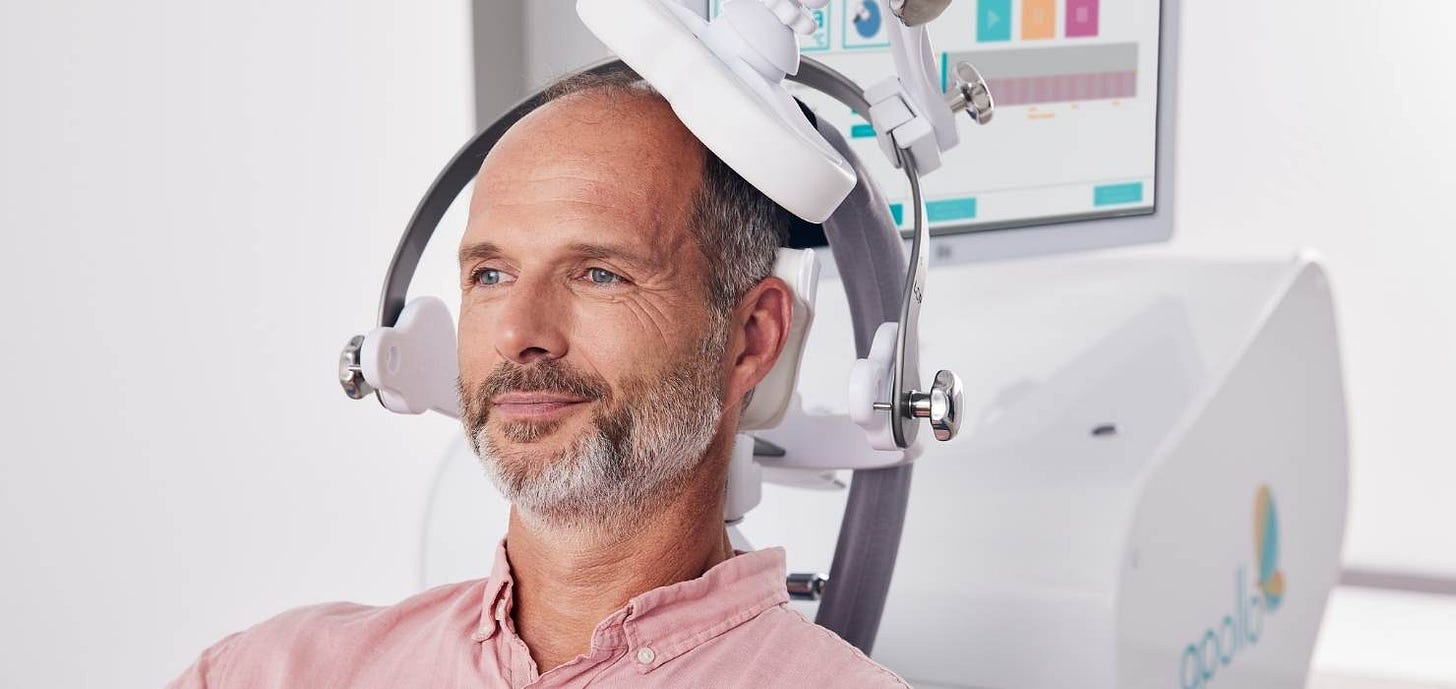Exploring Transcranial Magnetic Stimulation (TMS): A New Frontier in MdDS Treatment for Physical Therapists

Introduction
Mal de Debarquement Syndrome (MdDS) presents a unique challenge for patients and clinicians. This persistent sensation of rocking or swaying, even after disembarking from a boat or plane, can significantly impact daily life. While vestibular rehabilitation and other therapies provide a foundation for treatment, emerging research suggests that Transcranial Magnetic Stimulation (TMS) may offer a new avenue for managing this complex condition.
What is TMS?
TMS is a non-invasive brain stimulation technique that uses magnetic fields to modulate neuronal activity. It's been approved for various neurological and psychiatric conditions, and its potential applications are continually expanding. In the context of MdDS, TMS may help to:
Reset Abnormal Brain Activity: MdDS is believed to involve dysfunctional activity in brain regions responsible for processing motion and balance. TMS may help to normalize these patterns.
Promote Neuroplasticity: By stimulating specific brain areas, TMS could encourage the brain to reorganize and adapt, potentially leading to lasting improvements in MdDS symptoms.
Research Landscape
While research on TMS for MdDS is still in its early phases, promising findings have emerged. For instance, a pilot study by Chae et al. (2013) published in Neurology demonstrated that high-frequency TMS applied to the dorsolateral prefrontal cortex (DLPFC) resulted in short-term symptom relief for some MdDS patients.
TMS and the Physical Therapist's Role
Physical therapists play a critical role in the comprehensive management of MdDS. Here's how:
Vestibular Rehabilitation: PTs are experts in providing customized vestibular rehabilitation exercises to improve balance coordination and reduce dizziness.
Gait and Movement Training: MdDS can affect gait and movement patterns. PTs can address these issues through targeted exercises and functional training.
Specialized MdDS Protocols: PTs can administer or support specific MdDS treatment protocols, such as the Dai protocol, which involves personalized head-roll movements guided by accelerometer readings. These protocols, potentially used with TMS, may enhance treatment outcomes.
Patient Education and Support: PTs provide valuable education about MdDS, helping patients understand their condition and manage their symptoms.
Integrating TMS into Practice
As a physical therapist, staying at the forefront of MdDS treatment advancements is crucial. Here's how to integrate the evolving role of TMS into your practice:
Master MdDS Protocols: Develop expertise in specialized MdDS interventions, such as the Dai protocol, which uses personalized head-roll movements to recalibrate the brain's motion perception.
Forge Collaborative Partnerships: Build strong relationships with neurologists and TMS practitioners to ensure a comprehensive and coordinated approach to patient care.
Pioneer Combined Therapies: Explore the synergistic potential of combining TMS with MdDS protocols. This may involve optimizing the timing and sequence of treatments and tailoring parameters and exercises to individual needs.
Prioritize Patient-Centered Decision-Making: Thoroughly evaluate each patient to determine the most effective treatment strategy. Consider factors like symptom duration, severity, prior treatment responses, and individual preferences when deciding between TMS, a specific protocol, or a combined approach.
Call to Action
This is an exciting time for MdDS research and treatment. As physical therapists, we can expand our knowledge and contribute to a multidisciplinary approach that offers hope to individuals with this challenging condition.
Citation
Chae, J. H., Song, I. U., & Kim, J. S. (2013). Repetitive transcranial magnetic stimulation for Mal de Debarquement syndrome. Neurology, 80(7 Supplement), P06-011.
Dai M, Cohen B, Smouha E, Cho C. Readaptation of the vestibulo-ocular reflex relieves the mal de debarquement syndrome. Front Neurol. 2014 Jul 15;5:124. doi: 10.3389/fneur.2014.00124. PMID: 25076935; PMCID: PMC4097942.
Yakushin SB, Zink R, Clark BC, Liu C. Readaptation Treatment of Mal de Debarquement Syndrome With a Virtual Reality App: A Pilot Study. Front Neurol. 2020 Aug 18;11:814. doi: 10.3389/fneur.2020.00814. PMID: 33013617; PMCID: PMC7461907.
Cha YH, Gleghorn D, Doudican B. Occipital and Cerebellar Theta Burst Stimulation for Mal De Debarquement Syndrome. Otol Neurotol. 2019 Oct;40(9):e928-e937. doi: 10.1097/MAO.0000000000002341. PMID: 31436631; PMCID: PMC6744334.
MdDS Resources and Support Organizations:
MdDS Foundation:
https://www.mddsfoundation.org
Vestibular Disorders Association (VEDA):
https://vestibular.org



